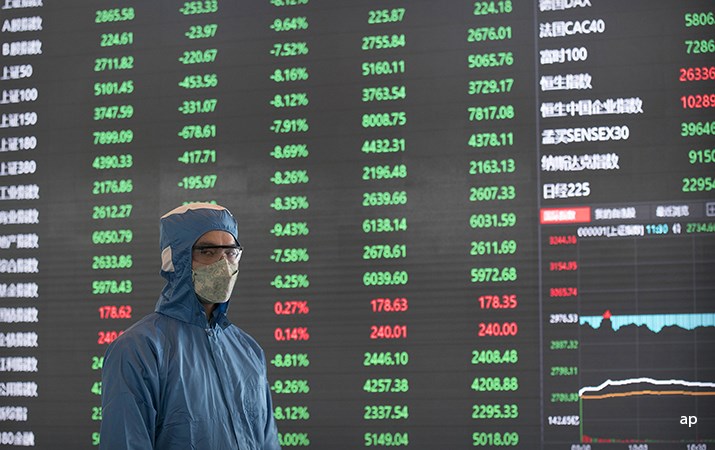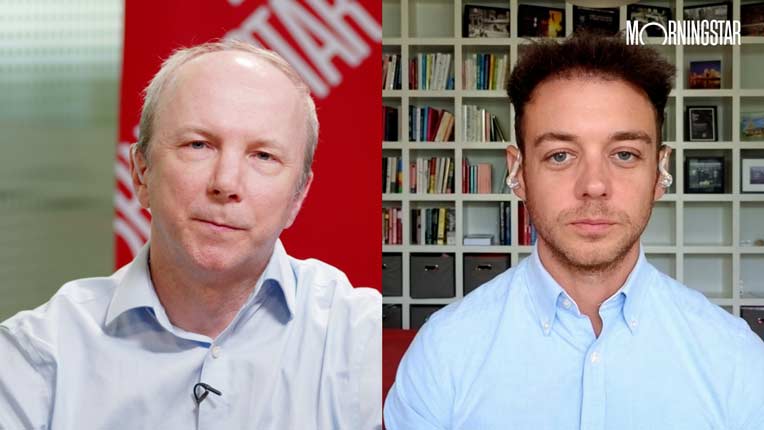
The coronavirus and its impact on global growth has rocked stock markets worldwide in recent weeks. The FTSE 100 last week fell below 6800 for the first time since December 2018, while stock markets in the US and Europe also endured heavy losses.
Given the ongoing market turbulence, we turned to some financial experts to find out what they're telling clients.
Vanguard
At the end of February, a Vanguard Perspectives post addressed the uncertainty that the coronavirus has injected into the global economy: “While Vanguard has a global team of economists, lack of certainty about how far the coronavirus will spread makes economic projections particularly challenging.”
Specifically, Vanguard’s economists expect the coronavirus to slow 2020 global economic growth by about 0.15 percentage points, translating into roughly $135 billion in goods and services delayed or not produced. Three factors will drive the consequences this year, it says: how far the virus spreads and how long it lasts; how much fear inhibits travel, consumer spending, manufacturing, and trade; and what actions governments take to stop the spread of the virus and boost growth. “The net effects won't become clear for at least several months," Vanguard concludes.
The upshot for investors? Remain focused on your long-term goals and be sure your portfolio is balanced across asset classes and diversified within them, in an appropriate combination for your risk tolerance.
BlackRock
Mike Pyle, global chief investment strategist at BlackRock, published a post on the BlackRock blog on February 20, detailing how the firm’s outlook has evolved since the coronavirus outbreak.
“We still expect the global growth to edge higher this year, even as the coronavirus outbreak has introduced uncertainties,” he says. “V-shaped recoveries in economic activities have often followed past epidemics - and we expect a repeat of this pattern. Yet the depth and width of the 'V' this time are highly uncertain. This outbreak could be more disruptive than past ones because it could be more severe, and because of greater reliance on global supply chains.”
Pyle notes that outbreak recoveries in the past have been driven by pent-up demand from consumers and a restart in manufacturing. But he also suggests that in the case of coronavirus, history may be an unreliable guide.
Charles Schwab
Liz Ann Sonders, chief investment strategist at Charles Schwab, notes in a February 24 commentary that at last the complacency about coronavirus and its impact on earnings and stocks has ended. The virus represents a huge supply shock, she says, and while US and global central banks may ease policy, the impact may be limited.
"Since the beginning of January, estimates for S&P 500 earnings per share have been cut for every quarter this year - with the largest haircut given to the first quarter,” she reports. “This has resulted in a move from expected growth of nearly 10% for calendar year 2020 to less than 8% at present. It’s hard to imagine that there aren’t more cuts to come; especially if the US dollar continues to strengthen. For the first quarter, the largest slashing of estimates has been for the consumer discretionary, industrials and materials sectors.”
Schwab suggests that investors focus on diversification and rebalancing, emphasise quality growth at reasonable prices, and tilt toward defensive larger-cap stocks.
Janus Henderson
Paul O’Connor, who leads Janus Henderson’s multi-asset team, addressed the unpredictability coronavirus brings to economic growth in a February 26 blog post.
“With the global situation remaining highly fluid, it is impossible to make any meaningful estimate of the full potential impact of the coronavirus on the global economy right now,” writes O’Connor. “When the virus was largely contained to China, consensus expectations were generally focused on a “V”-shaped recovery in global growth based on the anticipation of relatively swift containment of the virus and an energetic policy response. The broadening geographic spread of the virus raises many questions about this milder scenario, especially given the uncertainties surrounding both the effectiveness of containment measures and the scale of the policy response expected in most countries outside China.”
O’Connor suggests that because of the uncertainty, investors emphasize capital preservation and defensive strategies until the fog clears a bit--and he acknowledges this may take time.
Fidelity
Anna Stupnytska, global head of macro at Fidelity International, is expecting a hit of up to 50 basis points on global growth in 2020 as a result of the coronavrius, but points out that the economic recovery in China is already underway. While growth in European economies in Europe, such as Italy, may be more at risk, the US seems better-placed to cope with disruption, she adds.
A 2013 report by the World Bank estimated a mild flu pandemic could shave 0.7 percentage points off global growth, and a severe one 4.8%. The OECD, meanwhile, believes an escalation of the oubtkrea could half 2020 growth of 3% to almost 1.5%.
"The good news is that, unlike natural disasters such as floods and earthquakes, apacity should bounce back once things return to normal: factories and offices remain untouched and most people who fall sick recover," says Stupnytska. "However, the downside for investor is this may cause governments to wait and see how the virus spreads before turning on the fiscal taps."
While some central banks - notably the Fed and Bank of Japan - have hinted at monetary stimulus, this may have a limited impact with monetary policy already so loose.





























